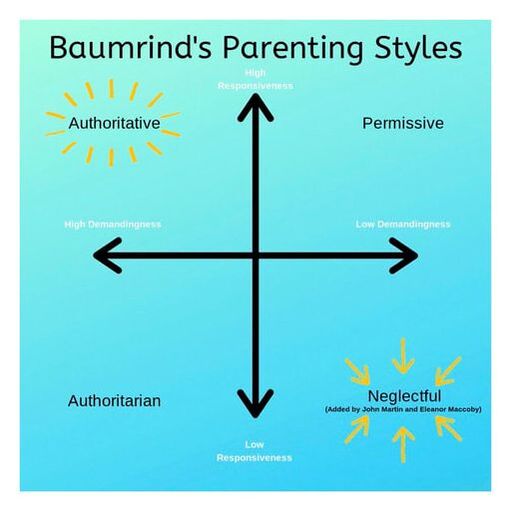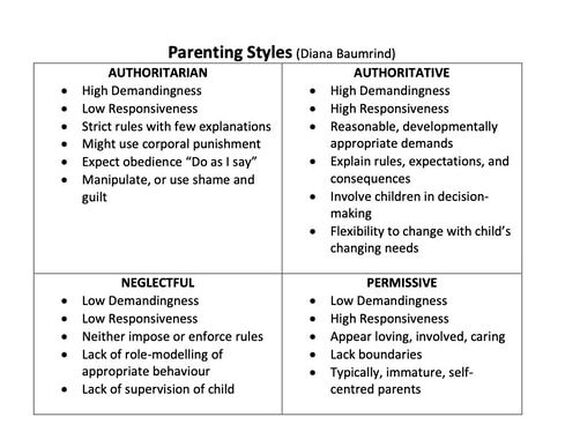Different Parenting Styles Might Lead to Conflict – Registered Social Worker, and Canadian Certified Counsellor, Chantelle Beach, explains four common parenting styles that most parents fit into, and the ways in which different parenting styles, and in turn different approaches to discipline, could lead to conflict within the marital relationship.Parenting style can determine discipline strategies used. An authoritarian parent is more likely to use punishment, such as assigning additional chores for misbehaviour, while an authoritative parent would likely spend time explaining why the behaviour was inappropriate and decide, along with the child, what the child could do to rectify the situation. A permissive parent would try to fix the child’s ‘mistake’, and a neglectful parent would probably not even notice or acknowledge the misbehaviour. Different discipline styles can lead to conflict among parenting partnerships. A permissive parent will spend their time covering up their child’s mistakes to avoid punishment from the authoritarian parent. An authoritative parent will bear the brunt of the disciplinarian load if the other parent has a neglectful style. This is one reason why it is so important for partners to be on the same page as parents. Many couples do not spend time discussing how they plan to parent and discipline their children prior to becoming parents, only to discover their differences once they are in the thick of parenting. Reading books, taking parenting courses, and talking with your partner are great ways to prepare for the adventure of parenting together. Being a parent is not an easy job, and getting stuck in a cycle of conflict with your partner over differences in parenting style only adds to the challenge. If you and your partner are struggling to be a team as parents, counselling can help you get on track.
Contact Chantelle Beach, RSW, CCC, at www.vitalsoulcounselling.com, to book an appointment if you could use some parenting support and conflict resolution now.
0 Comments
Routine, Routine, Routine!
Transitions are hard for children with ADHD. When you have a predictable routine, they know what to expect and they will feel more prepared. Rewards for Completing Tasks Many children with ADHD lack motivation, especially for undesirable or challenging tasks. Use what they love (screen time, park play, crafts) as rewards for completing necessary tasks. "No" means "No" All children need consistency and firm limits, but children with ADHD will take every crack in limits/consistency and create a hole, which leads to challenging behaviour. Physical Activity-Lots and Lots These children need an outlet for all of the energy buzzing inside their heads and bodies. Make time for this every day. Sleep Many children with ADHD have difficulties falling asleep or staying asleep. Make sleep a priority with a regular bedtime, along with quiet activities before bed (preferably not screen time). There are many great sleep strategies/supports available. Food Children with ADHD often crave sweets. The sugar gives a boost of energy, which gives these children the stimulation their brain is seeking. Unfortunately, eating lots of high sugar foods can also lead to weight gain, temper tantrums when the crash hits, dental issues, and refusal to eat nutrient rich foods. This pandemic has been tough on all of us. The isolation, lack of social connections, and added stress can cause us to feel edgy. Working from home, our kids doing online school at home, and our social time being spent mostly at home means we are spending much more time together as families. Mostly, this is a great thing, but it might also mean conflict in the home has increased. I thought it would be timely to offer some tips for managing conflict that can reduce distress at home.
Positive Ways to Deal with Conflict: Take a moment to think about why you are upset Usually your feelings run a little deeper than “You are being too loud while I am in a zoom meeting!” Maybe you are feeling displaced because you don’t have adequate office space at home. Choose one topic to discuss When we are upset, it is easy to get carried away and bring up everything that has bothered us about that person since the beginning of time. It is much more productive to discuss and resolve the issue at hand. No name calling! Calling names is unproductive, may cause long-term hurt feelings, and does not resolve the problem. Focus on the problem, not the person. Use “feeling” words By expressing how you feel, using “I” statements, you will be taken more seriously and others will be motivated to generate a solution. Wait your turn Everyone deserves an opportunity to say what they want to say. A good rule of thumb is: You have 2 ears and 1 mouth, listen twice as much as you speak. No silent treatment This is called “stonewalling”. No problem can be resolved by refusing to engage in a discussion. It takes effort to resolve conflict, so it is important to avoid this hurtful retreat response. Keep your voice in check Yelling causes people to shut down and walk away. If you can take a deep breath and talk in a normal tone of voice, much more productive discussions will evolve. Take a break If you feel emotionally charged, take a moment by yourself before you address the issue that is upsetting you. When we address conflict while we are emotionally heated, we often say hurtful things we do not mean to say. Infidelity, an affair, or cheating, is having sexual or emotional involvement with someone outside of a committed monogamous relationship. It causes deep emotional wounds and often leads to relationship breakdown.
With the Covid-19 pandemic causing increased stress for many people, relationships are suffering. Stress, whether shared as a couple or experienced individually, impacts relationships negatively. It causes conflict, irritability, or withdrawing. Some people turn to poor coping strategies such as substance abuse, numbing out on technology, or indulging in junk food. Stress can lead to a decrease in relationship satisfaction, and decreased relationship satisfaction can increase the risk of infidelity. Why do people cheat?
How does infidelity impact relationships?
How does infidelity impact the individual?
How can counselling help?
With the right intervention, some couples recover from the trauma of infidelity stronger than they were before the affair. How is your relationship weathering the pandemic? |
AuthorChantelle Beach, Counsellor, MC, RSW Archives
September 2021
Categories |



 RSS Feed
RSS Feed